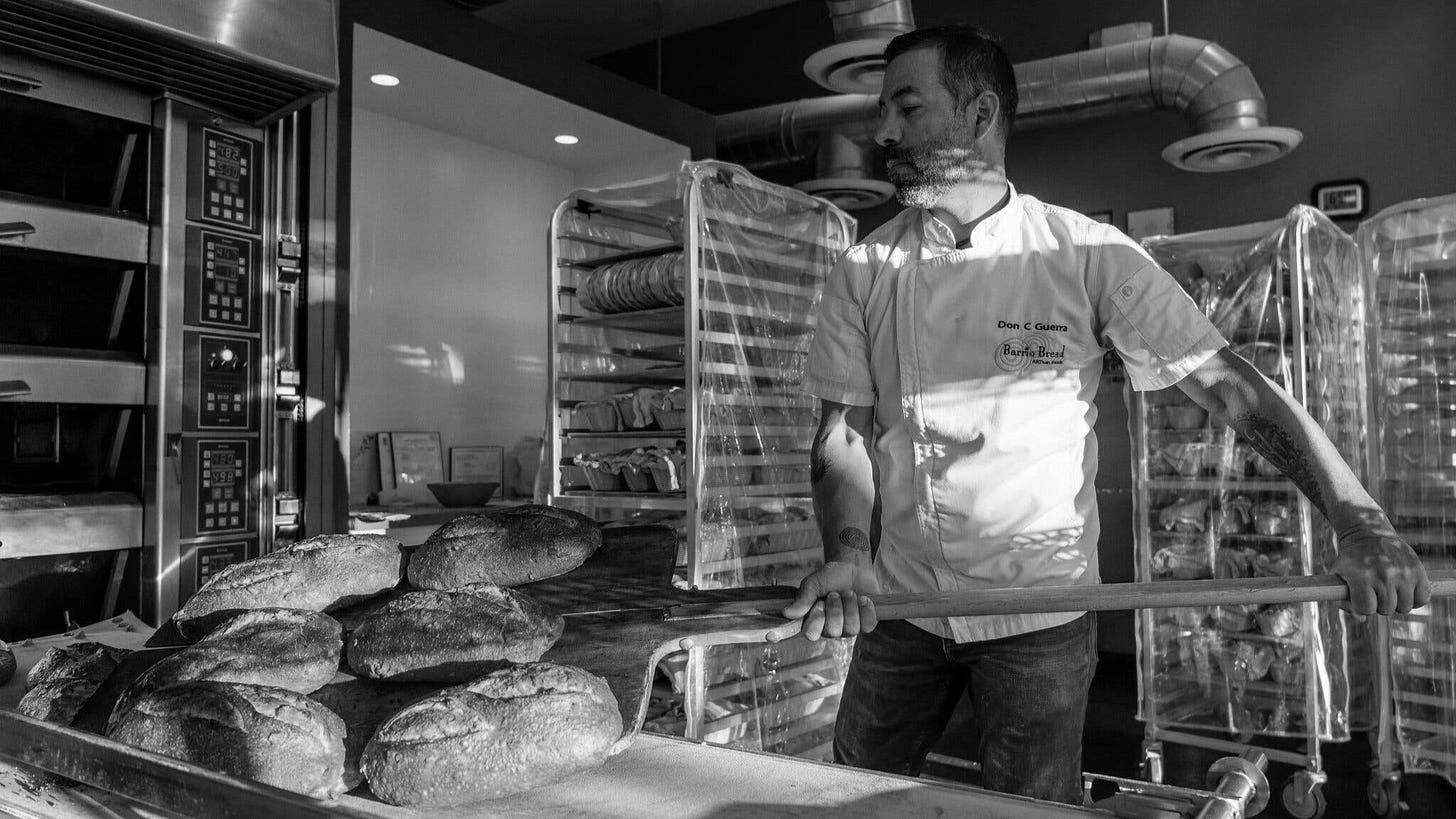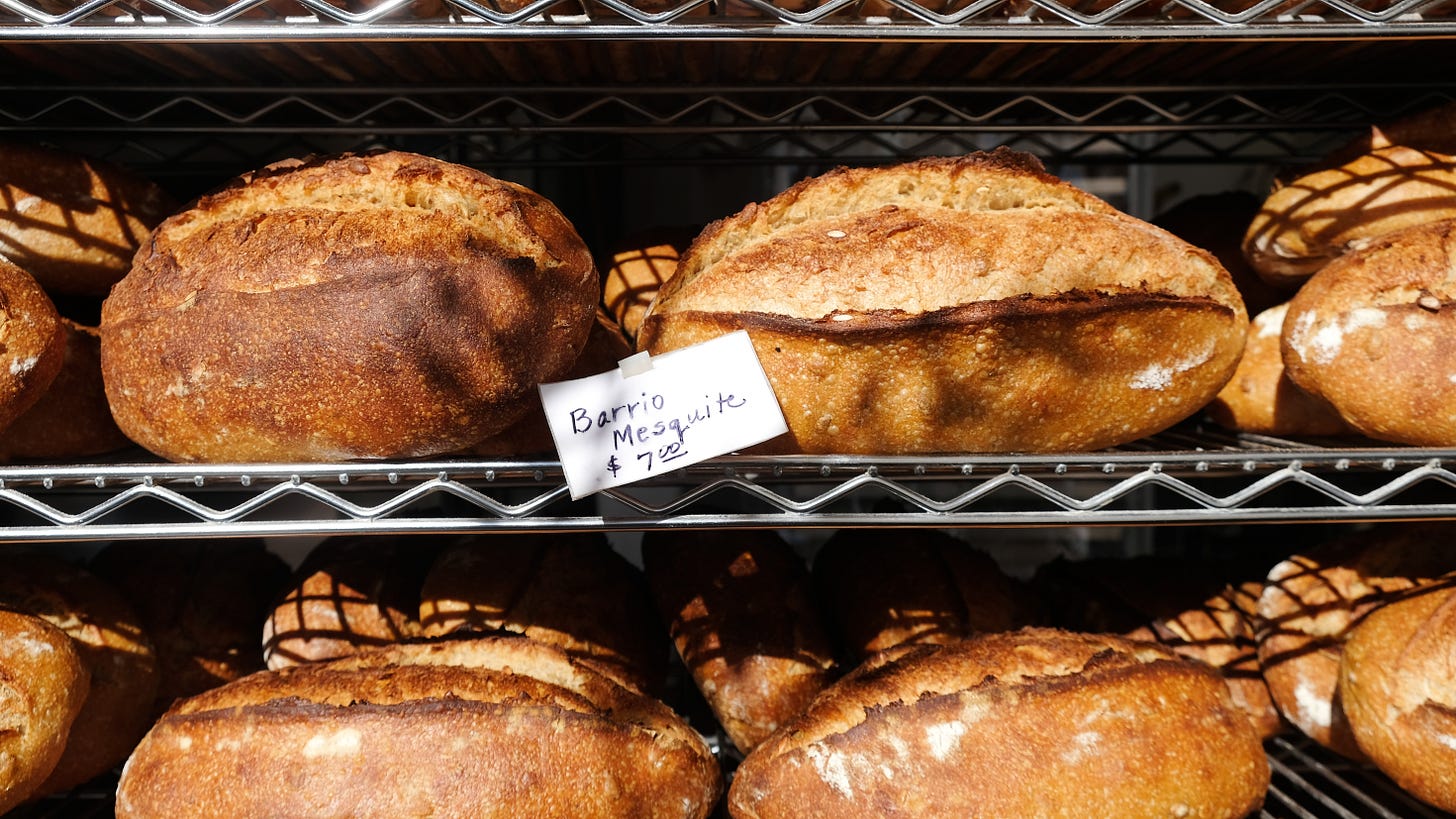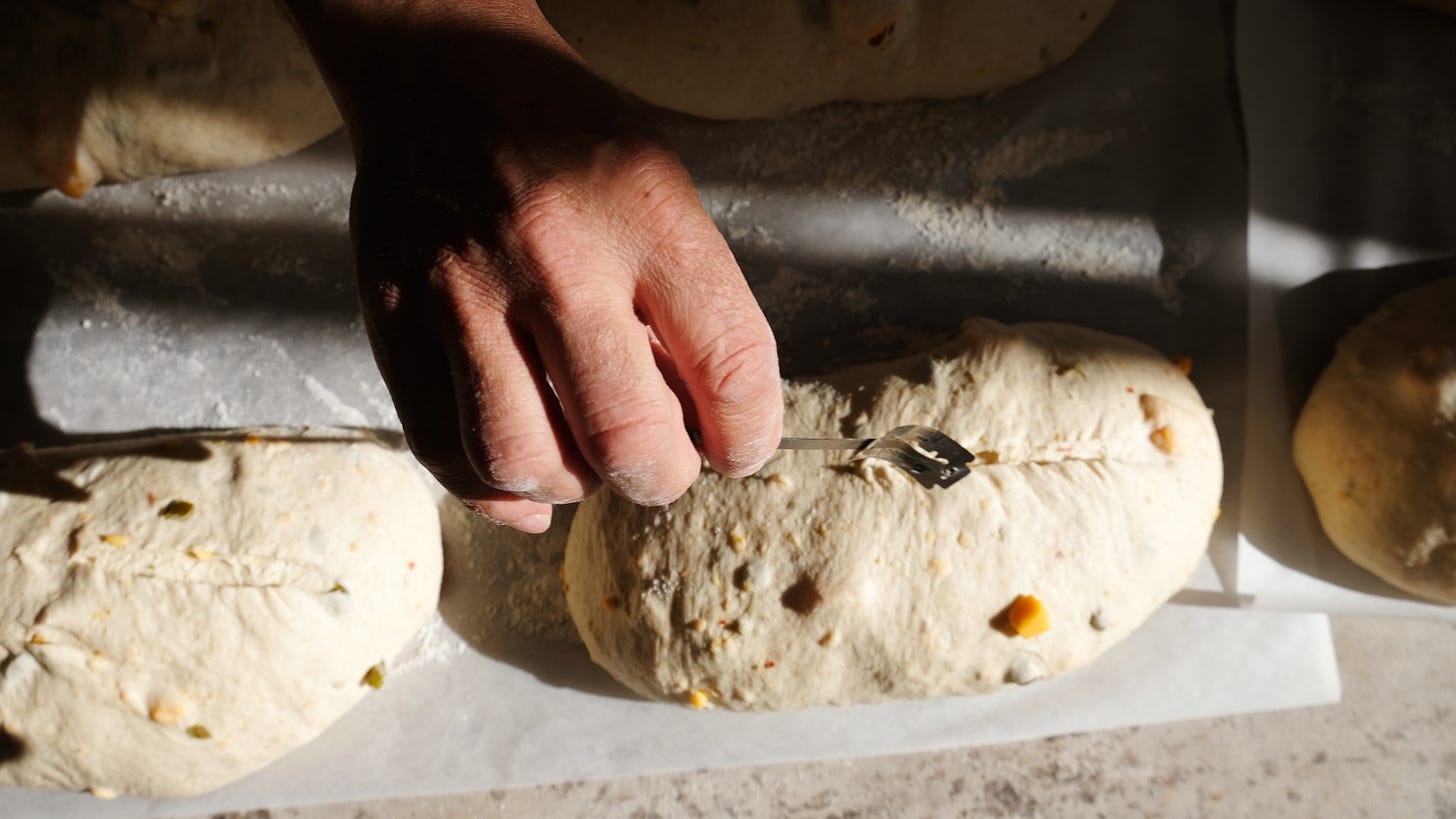Don Guerra is building a new heirloom grain economy
The baker and advocate on getting his start, working with heritage and ancient grains, and preserving small-scale farming.
Why hello there! Welcome to on hand! If you’ve landed here and somehow aren’t subscribed, I got you:
To say that Barrio Bread is the most exclusive food in Tucson is somewhat of an understatement but also not quite true. Sure, there’s a long line that forms every day even before his tiny shop opens and usually snakes through the parking lot. Everything there is good, but people, myself and my family included, wait in these early lines to make sure we have the pick of our favorites. But with his growing empire and new partnership with the family behind Tucson’s other beloved brand — El Charro Café — it’s easier than ever to get Don’s loaves around town.
My family has been buying bread from Don since he was selling out of his garage and he’s become a family friend because he’s an incredibly kind human, but also because he makes insanely good bread. I sat down with Don to talk about getting his start in bread baking, working with heritage and ancient grains, and preserving small-scale farming.
Brianna Plaza: Can you walk me through how you got started baking?
Don Guerra: I started baking in 1991 in Flagstaff, Arizona at a little bakery called Sundance bakery on South San Francisco Street. I made bread like yeasted whole wheat style bread — it was a hippie bakery
I really wanted to learn more so I read every book in the Flagstaff library on bread just trying to understand and get better every day. I was always really excited to go to work and I stayed in Flagstaff for about three years making bread at a couple of different bakeries.
In 1993 I was working at Arizona Bread Company and was introduced to Michel Suas, the legendary bread maker from San Francisco, and Thom Leonard, a baker from Kansas who started the company WheatField. They were consulting for a family in Ohio and I got involved with them on that project and it was awesome.
I had an aha moment and realized that if I went to school, learned about entrepreneurship and business, and wrote a business plan, I might be able to open my own bakery. I enrolled in business school at a local community college and worked on my business plan there. After about 9 months I was able to submit my project and eventually take it to a local bank for a loan. They were willing to fund it so I opened The Village Baker Flagstaff in 1995.
I was 25 years old when I opened that bakery and I’ve been working with a similar model ever since. I later opened up The Village Baker of Ashland and my wife and I relocated to Ashland, Oregon and we grew really quickly. I was really overwhelmed with the two shops and I didn’t really know how to manage them because I was the same age as my employees. I ended up selling the company around 2001 and we moved back to Flagstaff.
My wife was a teacher at the time and I wanted to be on the same schedule as her so I got my teaching credentials and taught for 7 years. The whole plan while I was teaching was to figure out how to get back into baking.
I started to talk to banks about loans but with the 2008 economic crash, there was just nothing available. I didn’t feel comfortable borrowing from my family so I decided to go for it and just do it out of my garage. I had seen it in Europe and Mexico and I figured I’d just figure it out. My last year of teaching I was doing part-time bread baking and full-time teaching — it was so crazy. On a Friday, I’d get up before school and feed my starters, go to work, then I’d come home and I would just pull an all-nighter and get bread ready for the Saturday market, then I’d come home and get to sleep at 2pm on Saturday afternoon.
I incubated Barrio Bread out of my garage for about eight years. In that time I baked 375,000 loaves by myself. At that point I started to think about my next move and applied for a few loans that I didn't get, so I started to apply for USDA grants that were designed for local food production and promotion.
It was an outreach education-focused grant so there was a community element to it so if you were given the money, you had to work directly with local farmers, make it into a food product, and resell it in your community, as well as complete so many hours of teaching and events.
I knew my background in baking and teaching were perfect for this so I applied and was one of 32 people in the country that got the grant. One day the acceptance letter showed up in my inbox and I basically got a check for $100k in the mail. There’s a lot that goes into growing a business so I took about $140k that I’d saved through my business, the grant money, and launched a GoFundMe to help me get the rest I needed to open up a space.
I was able to open my storefront without any debt and I’ve been able to start Barrio Grains and open up Barrio Charro as an extension of my teaching and collaborations with local businesses. Now the brand is strong enough where people recruit me to be part of their concepts.
I’m proud to say that now all my grains are Arizona-sourced which amounts to tens of thousands of pounds of local grains and wheats. I’ve created a model that’s not just baking bread, but is also an incubator for the local food and grain economies where farmers can grow and experiment with me and see what’s good and what works.
Brianna Plaza: Going back to your garage. How do you even set up a bakery in a garage? Do you need permits or do you just do it and ask for forgiveness later?
Don Guerra: I just went for it at the beginning. I was like, ‘I'm going to just do it. It's a weekend gig. I'm going to do this and figure it out.’ I told my neighbors that they could have first dibs and they were excited. I used electricity which was on my panel. My father-in-law is kind of a MacGyver guy so he helped me.
I had an Italian deck oven, proper mixers, refrigeration, work tables, racks, and a marble top work bench. I was rogue for about a year before Governor Jan Brewer signed a bill called the Cottage Food Law of Arizona that granted home-based food makers the right to sell in their community. I applied as soon as I could and I got the license and overnight I was like, ‘Whoa this is cool. Now I am totally legit.’
I started to do more interviews and more people started to want my bread. People from around the world reached out to talk to me about this concept. I taught this concept in Poland and in Taiwan and even before I left Taiwan, people were already starting to convert their garages into bakeries.
It was such a strange concept baking out of my garage and selling out of my Honda Odyssey to markets and CSAs. Eventually the New York Times caught on and that helped push the company forward, and I also had the grant from USDA.
The idea of working with local grains then caught on like wildfire around the world and I just happened to be light years ahead of what people were doing. And now I feel like it’s commonplace. If you’re an artisanal baker in America and you have a certain style of bread, you’re searching out what grains you can get from small-scale farmers because that’s now what it takes to be in the game.
Brianna Plaza: Had you always planned to focus on heritage grains, or did the USDA grant push you in that direction?
Don Guerra: Yeah. It's all of that. As a baker for years I would open a bag of flour, and I'd be like, ‘I wonder where this comes from?’ I’d use it and it always felt like there was something missing. I had the chance to work with some of the first millings of White Sonora wheat from Amado, Arizona.
I thought, ‘This is what I wanted to do my entire baking career. I've seen it in books, and I've seen it in movies, and it'd be so cool to know what heritage wheat feels and looks like.’ It seems ridiculous, but how many people really know what wheat looks like?
With my passion for food, and community and my previous university study, which is anthropology, I was like, ‘Wow, this could be me.’ I created this community-supported baker model which was about education. It was about sharing information and best practices, and teaching the community about the benefits of eating local grains, who the farmers are, and why we should support them.
I just went on this huge campaign, which I'm still on. It's sustainable. The farmers are happy. They're growing for me. They get paid. It's viable. It's fun. And they're feeling super good, just like me, about feeding our community. It's not some company in Italy buying up wheat through contract farming and you never see it again. I proposed that if you grow local wheat, people in this community will eat it. I'm on my third grant now.
I was awarded a grant in 2018 for my grain company, Barrio Grains, which is to support farmers. And recently, I filed another grant for Barrio Grains, which is the implementation grant. I just finished the planning grant for USDA. And that was $100,000 for a feasibility study of creating a flour company. I created blends, I have packaging, and I sell it.
Brianna Plaza: How do you select the varieties that you want to grow? Have you seen an increase in people growing these kinds of grains around the world?
Don Guerra: Part of it is I look at how the grain might perform. But also, it's about taste, and it's also about the classification of the wheat. I work with ancient, heritage, and modern wheats. Ancient is the oldest, of course, and heritage is pre-1950, and then Moderns are post-1950. The boutique grains are the Heritage wheats, and then the Ancient Grains are einkorn, emmer, and spelt.
This kind of grain growing is catching attention. Parts of the world have been doing this for years because it’s their ancient history but haven’t been recognized. But there’s definitely an increase in interest — it's slowly catching on.
You see these local grain economies popping up so it's gaining popularity. I think it’s because the world is shifting, not necessarily because it's like a total hipster move thing to do, but because you have some really passionate people saying we need to preserve small-scale farming.
There are thousands of varieties of grains for bread and it gives people within that ecosystem — from seed scientists to growers to millers to bakers to brewers — a chance to try out different varieties and have less reliance on big ag.
And then I have more people asking me questions about where their food comes from. I think COVID has reinforced the idea of people asking where their food comes from. There was this moment where there was no flour and people were like, ‘What do you mean I can’t get this?’ I benefited because I had already developed video courses before COVID and I had two years of grains in storage for the bakery, but I was able to sell to consumers when you couldn’t get flour anywhere else. People were amazed I had thought of all this but this was just the track that I was on.
These grains come from local farms and that’s why we need to take care of, respect, and value small-scale farming. Farming is not a pleasant job but a really important one.
Brianna Plaza: How has the pandemic changed your business?
Don Guerra: I changed the layout of my bakery because I couldn't have people come inside. I realized that basically everything in my bakery is on wheels. So what if I pushed the counter to the door? I then got one of those split doors — I made it counter top height and was able to push the counter up to the door and keep the top window open.
The start of the pandemic also zapped the restaurant industry. So, I was like, ‘Oh, crud, okay, what do I do now?’ Restaurants were struggling to survive, and those are my bread accounts, so it wiped out my wholesale.
I developed an online delivery system because I knew people did not want to go out of their house and the bread could be delivered to the doorstep. I recently switched the options from delivery to pickup because I didn’t have the delivery workforce but it’s even more popular with pickup in store.
I talked to other friends in the industry and they had to-go meal kits, or CSA type boxes. I started to think about that, and connect with people. We started to put my bread in their boxes and we worked on moving all of our food and products. I had been doing one CSA for a while but I was now working with a number of CSAs to sell my bread that way.
I still don’t have the wholesale business I used to have, but I made up for it.
Brianna Plaza: What was it like partnering with the family behind El Charro Café, another iconic Tucson brand?
It's really fun and I'm so excited. Carlotta is my partner chef and I know her reputation around town. She's got strong integrity and her family runs the oldest restaurant in Tucson. So, I'm like, ‘Wow, the brand would be strong if I teamed up with these guys.’ We get along great.
We started planning in the first week of February before COVID. We had done some planning up to then, but then, bam, COVID. It was rough timing, but we turned it into a positive time. We secured a space and we finally launched in January of 2021.
Everyone was like, ‘You're crazy. Why would you do that? You're in a pandemic.’ But we decided Tucson was ready to see something new. And if we're the first out of the gate with a new concept we can pull this off. I feel like we've created something that Tucson really loves. And they support us because of the two brands. You'll probably see a few more things with us coming up.
Brianna Plaza: What's one thing you would tell a new bread baker?
Don Guerra: Don't be intimidated by it. There's so much support now. And I think for me, it's an important life skill. Learning how to make, if anything, a basic pizza crust.
If you learn how to make a basic dough, like pizza crust, it'll open up your whole food world, because you're like, ‘I don't need to call somebody for a pizza.’ I know it's convenient. But if you learn to whip up a pizza dough, you can entertain yourself, and your friends, and it'll taste better. For the home baker, learn how to make a big basic dough, and have fun with it.
For the professional baker, don’t be so quick to go out and have your own bakery. Learn and study, it takes a long time, it takes a lot of repetition. I've been a baker for 30 years, and not a day goes by that I don't learn something new. Then, when you want to have your own bakery, do it simply and start out small. It's a study. It's an education, not just a job.
Other things ~
The New York Times looks at the untold story of sushi in America with a very cool interactive feature.
I am hosting Friendsgiving next weekend and I haven’t really started preparing. After a break last year for obvious reasons, my annual party is back for its 10th year (!!). I always make the turkey and a few sides and my inbox this week has exploded with Thanksgiving content from the newsletters I subscribe to. What’s your favorite turkey recipe? Drop a link in the comments plz.





